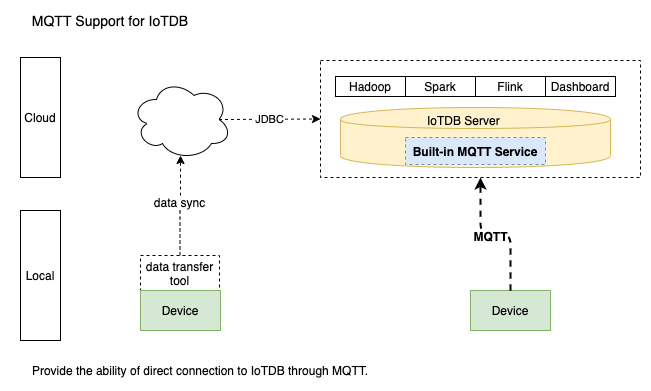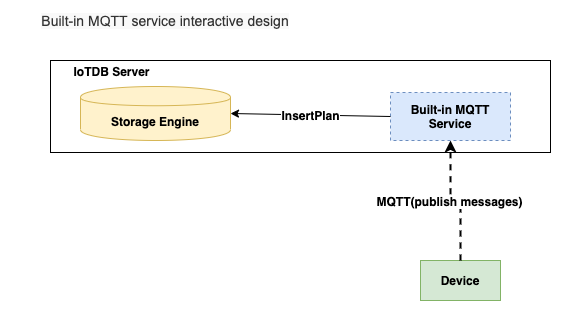MQTT Protocol
MQTT Protocol
1. Overview
MQTT (Message Queuing Telemetry Transport) is a lightweight messaging protocol designed for IoT and low-bandwidth environments. It operates on a Publish/Subscribe (Pub/Sub) model, enabling efficient and reliable bidirectional communication between devices. Its core objectives are low power consumption, minimal bandwidth usage, and high real-time performance, making it ideal for unstable networks or resource-constrained scenarios (e.g., sensors, mobile devices).
IoTDB provides deep integration with the MQTT protocol, fully compliant with MQTT v3.1 (OASIS International Standard). The IoTDB server includes a built-in high-performance MQTT Broker module, eliminating the need for third-party middleware. Devices can directly write time-series data into the IoTDB storage engine via MQTT messages.

2. Built-in MQTT Service
The Built-in MQTT Service provide the ability of direct connection to IoTDB through MQTT. It listen the publish messages from MQTT clients
and then write the data into storage immediately.
The MQTT topic corresponds to IoTDB timeseries.
The messages payload can be format to events by PayloadFormatter which loaded by java SPI, and the default implementation is JSONPayloadFormatter.
The default json formatter support two json format and its json array. The following is an MQTT message payload example:
{
"device":"root.sg.d1",
"timestamp":1586076045524,
"measurements":["s1","s2"],
"values":[0.530635,0.530635]
}or
{
"device":"root.sg.d1",
"timestamps":[1586076045524,1586076065526],
"measurements":["s1","s2"],
"values":[[0.530635,0.530635], [0.530655,0.530695]]
}or json array of the above two.

3. MQTT Configurations
The IoTDB MQTT service load configurations from ${IOTDB_HOME}/${IOTDB_CONF}/iotdb-system.properties by default.
Configurations are as follows:
| Property | Description | Default |
|---|---|---|
enable_mqtt_service | Enable/ disable the MQTT service. | FALSE |
mqtt_host | Host address bound to the MQTT service. | 127.0.0.1 |
mqtt_port | Port bound to the MQTT service. | 1883 |
mqtt_handler_pool_size | Thread pool size for processing MQTT messages. | 1 |
mqtt_payload_formatter | Formatting method for MQTT message payloads. Options: json (tree mode), line (table mode). | json |
mqtt_max_message_size | Maximum allowed MQTT message size (bytes). | 1048576 |
4. Coding Examples
The following is an example which a mqtt client send messages to IoTDB server.
MQTT mqtt = new MQTT();
mqtt.setHost("127.0.0.1", 1883);
mqtt.setUserName("root");
mqtt.setPassword("root");
BlockingConnection connection = mqtt.blockingConnection();
connection.connect();
Random random = new Random();
for (int i = 0; i < 10; i++) {
String payload = String.format("{\n" +
"\"device\":\"root.sg.d1\",\n" +
"\"timestamp\":%d,\n" +
"\"measurements\":[\"s1\"],\n" +
"\"values\":[%f]\n" +
"}", System.currentTimeMillis(), random.nextDouble());
connection.publish("root.sg.d1.s1", payload.getBytes(), QoS.AT_LEAST_ONCE, false);
}
connection.disconnect();5. Customize your MQTT Message Format
In a production environment, each device typically has its own MQTT client, and the message formats of these clients have been pre-defined. If communication is to be carried out in accordance with the MQTT message format supported by IoTDB, a comprehensive upgrade and transformation of all existing clients would be required, which would undoubtedly incur significant costs. However, we can easily achieve customization of the MQTT message format through simple programming means, without the need to modify the clients.
An example can be found in example/mqtt-customize project.
Assuming the MQTT client sends the following message format:
{
"time":1586076045523,
"deviceID":"car_1",
"deviceType":"Gasoline car",
"point":"Fuel level",
"value":10.0
}Or in the form of an array of JSON:
[
{
"time":1586076045523,
"deviceID":"car_1",
"deviceType":"Gasoline car",
"point":"Fuel level",
"value":10.0
},
{
"time":1586076045524,
"deviceID":"car_2",
"deviceType":"NEV(new enegry vehicle)",
"point":"Speed",
"value":80.0
}
]Then you can set up the custom MQTT message format through the following steps:
- Create a java project, and add dependency:
<dependency>
<groupId>org.apache.iotdb</groupId>
<artifactId>iotdb-server</artifactId>
<version>2.0.4-SNAPSHOT</version>
</dependency>- Define your implementation which implements
org.apache.iotdb.db.protocol.mqtt.PayloadFormatter
e.g.,
package org.apache.iotdb.mqtt.server;
import org.apache.iotdb.db.protocol.mqtt.Message;
import org.apache.iotdb.db.protocol.mqtt.PayloadFormatter;
import org.apache.iotdb.db.protocol.mqtt.TableMessage;
import com.google.common.collect.Lists;
import com.google.gson.Gson;
import com.google.gson.GsonBuilder;
import com.google.gson.JsonArray;
import com.google.gson.JsonElement;
import com.google.gson.JsonObject;
import com.google.gson.JsonParseException;
import io.netty.buffer.ByteBuf;
import org.apache.commons.lang3.NotImplementedException;
import org.apache.tsfile.enums.TSDataType;
import java.nio.charset.StandardCharsets;
import java.util.ArrayList;
import java.util.Arrays;
import java.util.List;
/**
* The Customized JSON payload formatter. one json format supported: { "time":1586076045523,
* "deviceID":"car_1", "deviceType":"NEV", "point":"Speed", "value":80.0 }
*/
public class CustomizedJsonPayloadFormatter implements PayloadFormatter {
private static final String JSON_KEY_TIME = "time";
private static final String JSON_KEY_DEVICEID = "deviceID";
private static final String JSON_KEY_DEVICETYPE = "deviceType";
private static final String JSON_KEY_POINT = "point";
private static final String JSON_KEY_VALUE = "value";
private static final Gson GSON = new GsonBuilder().create();
@Override
public List<Message> format(String topic, ByteBuf payload) {
if (payload == null) {
return new ArrayList<>();
}
String txt = payload.toString(StandardCharsets.UTF_8);
JsonElement jsonElement = GSON.fromJson(txt, JsonElement.class);
if (jsonElement.isJsonObject()) {
JsonObject jsonObject = jsonElement.getAsJsonObject();
return formatTableRow(topic, jsonObject);
} else if (jsonElement.isJsonArray()) {
JsonArray jsonArray = jsonElement.getAsJsonArray();
List<Message> messages = new ArrayList<>();
for (JsonElement element : jsonArray) {
JsonObject jsonObject = element.getAsJsonObject();
messages.addAll(formatTableRow(topic, jsonObject));
}
return messages;
}
throw new JsonParseException("payload is invalidate");
}
@Override
@Deprecated
public List<Message> format(ByteBuf payload) {
throw new NotImplementedException();
}
private List<Message> formatTableRow(String topic, JsonObject jsonObject) {
TableMessage message = new TableMessage();
String database = !topic.contains("/") ? topic : topic.substring(0, topic.indexOf("/"));
String table = "test_table";
// Parsing Database Name
message.setDatabase((database));
// Parsing Table Name
message.setTable(table);
// Parsing Tags
List<String> tagKeys = new ArrayList<>();
tagKeys.add(JSON_KEY_DEVICEID);
List<Object> tagValues = new ArrayList<>();
tagValues.add(jsonObject.get(JSON_KEY_DEVICEID).getAsString());
message.setTagKeys(tagKeys);
message.setTagValues(tagValues);
// Parsing Attributes
List<String> attributeKeys = new ArrayList<>();
List<Object> attributeValues = new ArrayList<>();
attributeKeys.add(JSON_KEY_DEVICETYPE);
attributeValues.add(jsonObject.get(JSON_KEY_DEVICETYPE).getAsString());
message.setAttributeKeys(attributeKeys);
message.setAttributeValues(attributeValues);
// Parsing Fields
List<String> fields = Arrays.asList(JSON_KEY_POINT);
List<TSDataType> dataTypes = Arrays.asList(TSDataType.FLOAT);
List<Object> values = Arrays.asList(jsonObject.get(JSON_KEY_VALUE).getAsFloat());
message.setFields(fields);
message.setDataTypes(dataTypes);
message.setValues(values);
// Parsing timestamp
message.setTimestamp(jsonObject.get(JSON_KEY_TIME).getAsLong());
return Lists.newArrayList(message);
}
@Override
public String getName() {
// set the value of mqtt_payload_formatter in iotdb-common.properties as the following string:
return "CustomizedJson2Table";
}
@Override
public String getType() {
return PayloadFormatter.TABLE_TYPE;
}
}- modify the file in
src/main/resources/META-INF/services/org.apache.iotdb.db.protocol.mqtt.PayloadFormatter:
clean the file and put your implementation class name into the file.
In this example, the content is:org.apache.iotdb.mqtt.server.CustomizedJsonPayloadFormatter - compile your implementation as a jar file:
mvn package -DskipTests
Then, in your server:
- Create ${IOTDB_HOME}/ext/mqtt/ folder, and put the jar into this folder.
- Update configuration to enable MQTT service. (
enable_mqtt_service=trueinconf/iotdb-system.properties) - Set the value of
mqtt_payload_formatterinconf/iotdb-system.propertiesas the value of getName() in your implementation
, in this example, the value isCustomizedJson2Table - Launch the IoTDB server.
- Now IoTDB will use your implementation to parse the MQTT message.
More: the message format can be anything you want. For example, if it is a binary format,
just use payload.forEachByte() or payload.array to get bytes content.
6. Caution
To avoid compatibility issues caused by a default client_id, always explicitly supply a unique, non-empty client_id in every MQTT client.
Behavior varies when the client_id is missing or empty. Common examples:
- Explicitly sending an empty string
• MQTTX: When client_id="", IoTDB silently discards the message.
• mosquitto_pub: When client_id="", IoTDB receives the message normally. - Omitting client_id entirely
• MQTTX: IoTDB accepts the message.
• mosquitto_pub: IoTDB rejects the connection.
Therefore, explicitly assigning a unique, non-empty client_id is the simplest way to eliminate these discrepancies and ensure reliable message delivery.
